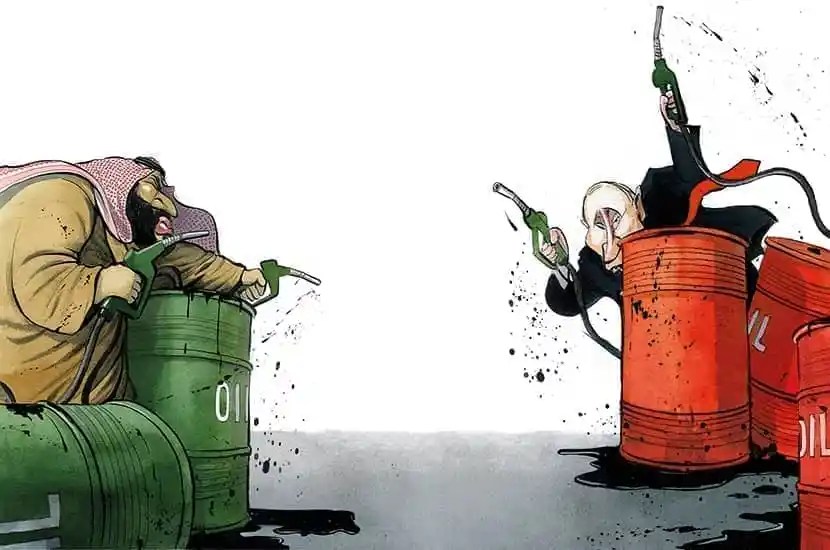It largely slipped under the radar, but there was a rare bit of good news for hard-pressed consumers and businesses this week: the next meeting of Opec+, originally scheduled for today, has been pushed back almost a week amidst rumours of splits between its members.
Most people struggling with inflation and the cost of living probably don’t look for salvation in the depths of the international and business pages. Few organisations cast a longer shadow over economic life in the West than the Organisation of Petroleum Exporting Countries (Opec) and its tag-alongs in Opec+.
Ever since it was first established in 1960, the purpose and mission of this organisation has been to coordinate global oil production in the name of fixing prices. In this, it has been extraordinarily successful: with the exception of a worldwide production glut in the 1990s and 2000s, it has been able to keep oil artificially expensive since 1974.
The result? Higher energy bills and costs of doing business in the West, and lots of extra revenue for a collection of deeply unsavoury and often hostile regimes.
Any fractures in the group could therefore have profound strategic implications, above and beyond bringing down our energy bills. The price of brent crude has already slumped after the postponement of today’s meeting was announced, and is now trading at £63.84 per barrel – down from around £71 in October.
So what’s going on? We naturally haven’t had anything official out of Opec+, but speculation is that there are deep divisions between core members, especially Russia and Saudi Arabia, and many of the bloc’s African members, such as Angola, Congo, and Nigeria, who want to lift the current caps on their production.
On the one hand, both the autocracies urgently need to keep global prices high – and none more so than Russia. Having originally expected to simply roll over what he views as a lost imperial province, Vladimir Putin now finds himself bogged down in a ruinously expensive war of attrition in Ukraine.
Although its spending on the war is a state secret, Reuters reports that Russia has doubled its defence budget to £80 billion, a third of all public spending. Other estimates claim that during intense phases of the conflict, it has cost Moscow between £395 million and £795 million a day.
Never having developed a diverse capitalist economy, and now burdened with historically-severe western sanctions, Russia is entirely dependent on her oil exports. Yet Russian crude is relatively expensive to produce; if global prices fall too far, that last lifeline could be wiped out.
Saudi Arabia’s position is not quite so existential. But Mohammed bin Salman, the ruling Crown Prince, also needs big oil margins to finance a string of grandiose infrastructure megaprojects.
His Vision 2030 programme, intended to cement the Kingdom’s position at the heart of the Arab and Islamic worlds, includes no less than seven extraordinarily grandiose ventures. Just one of these, Neom – a 170km urban development intended to be the world’s first ‘linear city’ – is estimated to cost at least £400 billion, and is already more than a decade behind schedule.
According to expert estimates, Riyadh needs oil prices to stay north of $80 (£63) a barrel to fund these initiatives and balance its budget. If not, bin Salman will be uncomfortably aware of the fate of other regional autocrats, such as the Shah of Iran or Emperor Haile Selassie of Ethiopia, who put futurist ambitions ahead of the needs of their people.
Given this context, it’s not surprising that both Saudi Arabia and Russia have each voluntarily cut production, above and beyond the restrictions agreed by Opec, and are pushing for further reductions.
Their African partners, however, are in a very different place. For them, oil exports are essential not to finance wars or super-cities, but to develop and modernise their economies.
Not only are they much less in sympathy with the geo-strategic objectives behind Opec’s recent behaviour, but they also benefit less from the restrictions. This was most obvious at the previous summit, where the bloc bought off the United Arab Emirates, which wanted to expand its own production, by further reducing the quotas of African states.
Any alliance that so obviously treats some of its members as second class was always going to run into trouble. But global conditions will be adding to the pressure.
On the supply side, there is fresh pressure on prices from the United States, which is ramping up production and stockpiling huge reserves – adding 8.7 million barrels just last week. At the same time, the economic slowdown in Europe and China – the world’s second-largest oil consumer – means that both markets are forecast to have lower oil demand in the months ahead.
Our next step should be to reach out to those Opec members who are increasingly losing out
Opec has always been a fractious cartel, its members united by little more than a common interest in manipulating oil prices. But when times are good – and when you have a stranglehold on the world’s most important resource, they often are – it’s proved relatively easy to patch things up and paper over any disagreements.
That may be a thing of the past. Russia and Saudi Arabia have over-extended themselves to the point where fixed prices are not just a route to excess profits but increasingly essential to their regimes, just at the point when demand is contracting and western democracies such as Canada, Norway, and the US are taking steps to ramp up their own production.
Our next step should be to reach out to those Opec members who are increasingly losing out from the bloc’s arrangements, with a view to forging new partnerships and tempting them to break with the axis of autocracies at the heart of the cartel. Because ultimately, a divided OPEC is good for the West – and the world.






Comments